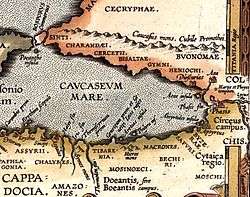Mossynoeci

Mossynoeci (Georgian: მოსინიკები, Greek: Μοσσύνοικοι, Mossynoikoi "dwellers in wooden towers") is a name that the Greeks of the Euxine Sea (Black Sea) applied to the peoples of Pontus, the northern Anatolian coast west of Trebizond.
Herodotus
Writing soon after 430 BCE, Herodotus in Book 3 cites the Mossynoeci, along with the Moschoi, Tibareni, the Macrones and Marres as comprising the 19th satrapy established by Darius of Persia. The satrapy as a whole was to yield three hundred talents.
Xenophon
According to Xenophon's Anabasis (5.4.26-34), the Mossynoeci were "fair-complexioned and white-skinned", "with their backs variegated and their breasts tattooed with patterns of all sorts of flowers". The Mossynoeci accepted the rule of a common metropolis.
Xenophon described that he had led his troops through Mossynoeci territory during the spring after the battle of Cunaxa, so 400 BCE. During this time the Mossynoeci also ruled over the Chalybes. When Xenophon was at Trebizond, those Mossynoeci in the vicinity had fallen out of favor with those of the metropolis; so Xenophon's army attacked the metropolis and defeated its king.
Jason and the Argonauts
The Mossynoeci are mentioned in Apollonius of Rhodes's (third century BCE in Alexandria) epic poem The Voyage of Argo. In Book 2: Onward to Colchis, he writes, "These people have their own ideas of what is right and proper. What we do as a rule openly in town or market-place they do at home; and what we do in the privacy of our houses they do out of doors in the open street, and nobody thinks the worst of them. Even the sexual act puts no one to blush in this community. On the contrary, like swine in the fields, they lie down on the ground in promiscuous intercourse and are not at all disconcerted by the presence of others. Then again, their king sits in loftiest hut of all to dispense justice to his numerous subjects. But if the poor man happens to make a mistake in his findings, they lock him up and give him nothing to eat for the rest of the day." [1]
Other
It is possible that the town Mossyna was named for them.
See also
References
- Book: Rhodes, Apollonius of. The Voyage of Argo. Translated by E. V. Rieu. Penguin Classics: London, 1959. Lines 1007-1024.
- ↑ Book: Rhodes, Apollonius of. The Voyage of Argo. Translated by E. V. Rieu. Penguin Classics: London, 1959. Lines 1007-1024.